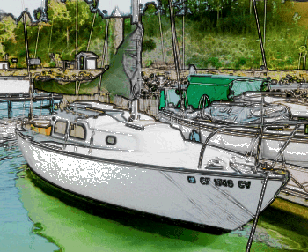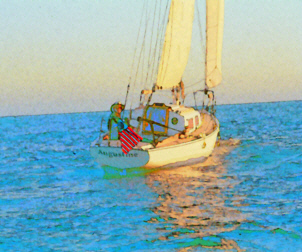About the Pearson Ariel



e-mail to: myrmade@solopublications.com
This site has no affiliation with any manufacturer of sailboats. The contents provided in the reviews sections below or in letters to this page are the opinions of those who wrote them and not the opinions of the author of these pages.
The focal point of this site is the Pearson Ariel "Augustine," hull #330, the restoration of and modifications to Augustine, and some information on her sailing charactistics..
The other purpose of this page is to provide information on the Pearson Ariel, and to provide a portal for access to on-line information on the Pearson Ariel. Links are provided to other Pearson web sites.
Additional Information from printed brochures on the Pearson Ariel is provided on other pages linked to this site.
We will appreciate any corrections, additions or other suggestions for improving this web page.Photos of Pearson Ariels, information on Pearson boats, and links to other sites dealing with Pearson boats are welcome.
The Pearson Ariel is a 25 foot, 7 inch sloop with a modified full designed by Carl Alberg and built by Pearson Yachts of Bristol, Rhode Island. You will find much information on the Pearson Ariel on the Ariel Class Association web site listed in our links section below. If you are a Pearson Ariel owner or hope to be, you would be well advised to join the Pearson Ariel Association and visit the Class Association Website often. It is an information intense masterpiece.
A few paragraphs are included below from the original typed letter by Pearson Corporation that came with Augustine when she was sold in 1965 as a new boat. The punctuation has not been altered from that used in the original text.
"In 1959 the Pearson Corporation exhibited the first Triton in the New York Boat Show. This 28 foot fiberglass auxiliary marked the beginning of a new era in the sport of sailing. So good was the reception of the Triton that it soon became evident that a slightly smaller version of the Triton would be desirable. The basic requirements had to be as nearly as possible that of the Triton. This became a real challenge since something had to give and it couldn't be the dimensions of the human body. Carl Alberg, a past master of this sort of thing accepted the challenge and after one look at his plans we were ready to build. The changes were very simple. The separate compartment for the head was eliminated and the head itself was moved forward between the V berths in the forward cabin. The bunks in the main cabin were extended under the galley area on one side and other the icebox on the other. The other interior appointments were so compact and well planned that it is difficult to imagine any alternative arrangement.
All that remained was to name this little cruiser. So much enthusiasm was displayed by all concerned that a decision became a major problem. This problem was quickly and simply solved however by one of our fine dealers who sent in the suggestion, "Ariel" (together with a substantial order.) There was no further discussion.
Thus the Ariel was designed, built and christened. It is interesting to note that although the first Ariel was not completed until early spring (thereby missing the major boat shows) the entire production of 60 boats for that year was sold out and all indications are that she will follow in the footsteps of her now famous big sister the Triton.....
Pearson Corporation"
| LOA | 25 feet, 7 inches |
| LWL | 18 feet, 6 inches |
| Beam | 8 feet, 0 inches |
| Draft | 3 feet, 8 inches |
| Ballast | 2500lb. lead (lead)** |
| Total Displacement | 5,120 lb. |
| Sail Area | 307 square feet |
| Hull: | Integrally molded fiberglass reinforced polyester resin |
| Deck, trunk, and cockpit: | Integrally molded fiberglass reinforced polyester resin |
| Deck Surface: | Non skid |
| Spars: | Aluminum anodized |
| Seacocks: | Four bronze ball valves, two for cockpit and two for head |
| Ports: | Four fixed, two opening |
| Hatches: | One companionway, one forward, one in counter stern |
| Berths: | Four |
| Water tank: | Forward under V berth |
| Galley: | Fresh water sink |
Owners Manual for Pearson Ariel
The Ariel Association has published a revised Owners Manual and Maintenance Guide. The new Second Edition of the Guide includes extensive discussions of Ariel and Commander maintenance requirements, factory drawings of original Pearson hardware, sources of original vendor-supplied hardware, a list of suitable replacement suppliers and guides for several custom modifications.
Improvements in the Second Edition include: A table of contents and index. There are also more illustrations, and in addition to copies of the Pearson drawings, there are several by Carl Alberg, including drawings of the Commander. Please contact them at: http://www.pearsonariel.org/.
I purchased Augustine in 2001. Her name was not Augustine then. As far as I can tell the only name printed on the transom before 2001 was "Vagaré". Under that name she enjoyed an active racing life on San Francisco Bay. The original name was removed many years before I came to know her. The name that I chose for the boat was Augustine. Augustine is a character in my novel, The Final Mercy. In that book, Augustine is a white female pigeon (European rock dove) Augustine represents the idealized concept of the beloved. Pigeons provide comic relief in a very serious novel about love, death, mercy, a group of aging California surfers, and a boat designed by Carl Alberg. It is also worthy of note that in real life, a flock of pigeons once emerged from a nest built in hull # 330's lazarette locker.
![]() For photos of "Augustine" see our photo page.
For photos of "Augustine" see our photo page.
Copyright by Scott Galloway 2002. All rights are reserved.
Back To The Table of Contents
Return to Solo Publications Web Index
This page was created by myrmade@solopublications.com